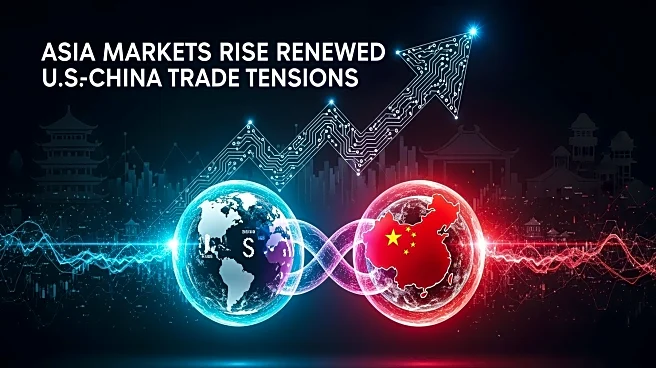What's Happening?
Asia-Pacific markets experienced gains on Wednesday, diverging from Wall Street's declines following renewed trade tensions between the U.S. and China. President Trump criticized China for not purchasing
soybeans, labeling it an 'economically hostile act' and threatened potential retaliatory measures such as a cooking oil embargo. This development has contributed to heightened market volatility. Despite these tensions, Japan's Nikkei 225 index rose by 1.76%, South Korea's Kospi increased by 2.68%, and Hong Kong's Hang Seng Index climbed by 2.06%. Meanwhile, China's consumer prices fell more than expected in September, indicating ongoing deflationary pressures and sluggish domestic demand.
Why It's Important?
The renewed trade tensions between the U.S. and China have significant implications for global markets and economic stability. The U.S.-China trade relationship is crucial for international trade dynamics, and disruptions can lead to increased volatility and uncertainty in financial markets. The rise in Asia-Pacific markets suggests regional resilience despite these tensions, but the broader impact on global trade and economic growth remains a concern. Stakeholders in industries reliant on U.S.-China trade, such as agriculture and manufacturing, may face challenges due to potential retaliatory measures and shifting trade policies.
What's Next?
The ongoing trade tensions may lead to further diplomatic negotiations or retaliatory actions between the U.S. and China. Market participants will closely monitor any developments or statements from both governments that could influence trade policies and economic relations. Additionally, the impact on consumer and business sentiment in China, as indicated by the deflationary trends, may prompt policy responses aimed at stimulating domestic demand and stabilizing prices.
Beyond the Headlines
The trade tensions highlight the complex interdependencies in global trade and the potential for geopolitical conflicts to impact economic stability. The situation underscores the need for strategic diplomacy and economic policy adjustments to mitigate adverse effects on international trade and investment. Long-term shifts in trade alliances and supply chain strategies may emerge as countries seek to reduce reliance on volatile trade relationships.










